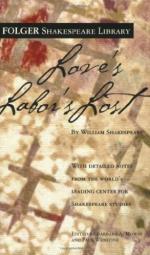|
This section contains 9,714 words (approx. 33 pages at 300 words per page) |

|
SOURCE: “Full of Dear Guiltiness: The Playfulness of Love's Labour's Lost,” in Shakespeare's Pastoral Comedy, The University of North Carolina Press, 1972, pp. 49-77.
In the essay below, McFarland analyzes the comic spirit and form of Love's Labour's Lost, noting the artificiality and thematic significance of its paradisiacal setting.
The setting of Love's Labour's Lost is not that of Arcadia. The action occurs in the King of Navarre's park. Such a variation of the pastoral environment is significant for the special kind of playfulness in which the plot revels.
The park, though not Arcadia, is nonetheless truly a pastoral environment. There is no hint of city life within its confines; its inhabitants, particularly those of the subplot, where we might anticipate a world of tradesmen, carpenters, blacksmiths, and other cogs in the economic machine of urban actuality, are singularly free from the necessity of providing for the maintenance of...
|
This section contains 9,714 words (approx. 33 pages at 300 words per page) |

|


